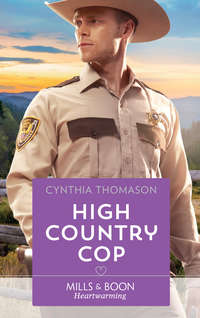
Полная версия
An Unlikely Match
Jack spared her a quick glance as he pulled on the door handle and then let his gaze linger. The prim and proper mayor sure looked sexy raking her slim fingers through a tangled mass of sunstruck hair. And then he forced his mind to his mission. He doubted that she would appreciate knowing he was evaluating her sex appeal, especially when she was so busy expressing how serious she was about protecting her town’s status quo. He smiled to himself. In their own ways, both he and the mayor were in the protection business.
“People, Claire,” he said, responding to her question. “Archie Anderson is afraid of everybody he doesn’t know and half of those he does. I suppose it’s a curse of being excessively wealthy. If you don’t watch your back all the time, you’d better have someone around who watches it for you.” He got out of the car but leaned back in the window. “That’s what he hired me to do.”
She got out, walked to the gate and began helping him clear away vegetation so they could locate the lock. “Well, I think that’s sad,” she said. “A man lives his whole life being afraid of his own shadow for no reason—”
“Oh, he’s got reason,” Jack interrupted her. Having uncovered the rusted lock, he stuck the key into the hole. “On average, Anderson gets a half-dozen credible threats a month. All it takes is for one of them to be real and successful, like when Archie’s ten-year-old son was kidnapped twenty-two years ago.”
He heard her gasp as he turned the key. The giant gate swung inward, pulling twisted vines from their tenuous strongholds. Jack swept his arm toward the car as if he were a maître d’at one of New York’s finest restaurants. “Shall we drive in, Claire?”
CHAPTER FOUR
CLAIRE DIDN’T REMEMBER walking back to Jack’s vehicle, but somehow she ended up in the passenger seat again. Kidnapped! Just the mention of the word was enough to send any mother into an emotional nosedive. And, in Claire’s case, to make her feel like a fool. What right did she have to criticize Archie Anderson for the way he chose to live his life? She, the mayor of one of the most liberal-thinking communities in the state, if not the country, ought to have known better than to prejudge anyone. What had her father always said? “You can’t know a man until you walk a mile in his shoes.” That old axiom had never made more sense to Claire than it did now.
Hogan got behind the wheel and looked over at her. “Are you all right?”
She turned to him. “I had no idea.”
“What? The kidnapping? Of course you didn’t. How could you?”
She fumbled for words. “It must have been in the papers. I mean, Archie Anderson. Everybody’s heard of him. Something like this must have been big news.”
“It was twenty-two years ago. How old were you then, Claire? Ten?”
Actually she had been thirteen, and Hogan had a point. She had been more interested in ballet slippers than newspapers at that time in her life, and anyway, she would never have noticed a news article about a Manhattan man whose son had been kidnapped.
“Besides,” Hogan continued, “Archie wasn’t the headliner he is today. And he used his influence to keep the story out of the press. He didn’t want to give another crazed opportunist any ideas.”
“I can understand that,” Claire said.
“And maybe now you can understand Anderson’s motives a little better, too. Like you said, everybody’s heard of him, and that’s a big part of the reason he needs protection.” Hogan steered the big vehicle through the gate. “You’d be surprised how many celebrities and corporate bigwigs have people just like me on the payroll.”
“And politicians, too, I suppose,” she said.
“Absolutely. After my Secret Service training, I spent most of my career in Washington, D.C., protecting some political heavyweights, including the president.”
“You were on the president’s security team?”
“For a while.”
Claire decided that Archie Anderson had a security expert who came well qualified. Discovering that Jack had worked in powerful circles, she realized they had that in common. When she’d been a rookie in the public-relations department of Dade County government, she’d mingled with some pretty influential political figures, though none of them could compare to the president of the United States. And none of them had impressed her like Roman Betancourt, whose arresting good looks and charming personality had given him celebrity status in Miami.
A Cuban immigrant who came to South Florida when he was only a boy, Roman rose quickly to the ranks of the privileged and respected in the Latin community. He put himself through school at the University of Miami, and then, with determination and an uncanny ability to recognize a successful business opportunity before anyone else, he amassed a chain of lumberyards and acquired his contractor’s license. When persuaded by powerful compatriots to run for state senator, Roman campaigned with panache and won in a landslide.
It was during his second term in office, when Roman was forty-six years old, and recently divorced, that Claire, then twenty-four, was introduced to him. Claire’s assignment was to plan the details of Roman’s appearances at a series of political and social events in conjunction with the gubernatorial race. And, as Claire recalled now, the rest of the story was the stuff of dreams. She and Roman married a few months later, and she became stepmother to his teenaged son, Carlos.
A year later, Jane was born, and Claire believed that she was destined for the happily-ever-after that every girl longs for. But her fairy-tale life had only lasted six more years, and had ended with an anguish so all-consuming that Claire woke every morning reminding herself to breathe. She’d been living her dream one moment, and the next, the dream was ended by an agonizing cancer that had invaded Roman’s tissues and blood and had robbed him and his family of a future.
Claire flinched when she realized Jack was talking and she’d been too absorbed in her own thoughts to hear him. She tuned in to his voice.
“Most people know that the country’s leaders and celebrities have security personnel,” Hogan said. “But it’s also true for men like Anderson. He’s really not the exception, though my staff is probably larger than most.”
“My husband was always concerned with security,” she said, picturing the creases in Roman’s brow when he’d tried to persuade her to let him hire a bodyguard whenever she traveled any distance without him. “But I was stubborn. I didn’t like the idea of being shadowed by someone all the time. I didn’t think it was necessary. Everyone liked Roman,” she added, realizing how indefensible her casual attitude must sound to a man like Hogan. But at the time, Claire couldn’t imagine that Roman had any enemies. Yet, looking back, could she truly be certain he hadn’t?
“My only concession was to seek his approval of anyone I hired to watch Jane,” she said. “Roman always had those employees checked out carefully, and, of course, I approved of his caution in that instance.”
A chill skittered down Claire’s spine when she wondered now if Jane’s caregivers had truly been without blemish. How careful did a parent have to be, especially when the family lived in a big city like Miami? She took a deep breath, calming her fears. She lived in Heron Point now. Things were different here.
She looked at Hogan, who was avoiding ruts in the narrow road bordered with sweeping palms. “How did it happen with Anderson’s son?” she asked.
Hogan frowned. “The kid was taken right off a ball field within a hundred yards of Archie, who was watching his game from the bleachers. You’d think a playground would be safe, but it wasn’t.” He shook his head, a reaction to a sad truth he obviously believed in. “Over the years I’ve learned that no place is safe.”
Claire refused to give in to such a pessimistic outlook. There were safe places, and she’d found one on this island. She felt as safe here as she had in the Ohio farming community where she’d grown up. There, folks were decent. And in Heron Point, people lived their lives according to their own dictates, and with the exception of a few laws and regulations, they could do pretty much what they wanted on the island. Claire believed that freedom of thought and action kept her neighbors content, and contentment bred peace.
But her heart ached for Archie Anderson, a man she’d never met who’d suffered unimaginable pain. And her sympathy went out to Jack Hogan because his cynicism had colored his world so that he viewed all humanity with a suspicious eye. “How did it turn out?” she asked, fearful of the answer. “Did Mr. Anderson get his son back?”
“I’m happy to report he did.” Hogan swerved to avoid a deep furrow in the road. Spiky palm fronds brushed the side of the car below Claire’s window. “This reminds me of the jungle,” he said with enough conviction that Claire knew he’d been there.
“But we’re almost out of it,” he added, pointing to a spear of sunlight a few hundred feet ahead. “Archie paid the ransom, which was only two hundred thousand dollars. Not a lot for a man like Anderson even in those days. The kidnappers mostly wanted to make him suffer because he’d fired the ringleader from his job as a foreman on a job site.”
Jack glanced over at Claire. “Believe me, the man deserved to be fired. And he definitely deserved what he got when the police eventually found Ethan. He and his accomplices had kept the boy locked in a cellar for two weeks while they negotiated their terms. From what I’ve heard, and what I can imagine, it was hell. Mrs. Anderson had to be hospitalized, and never fully recovered.”
“And Ethan?”
“They tell me he’d lost weight, and he was filthy. And he didn’t talk for a long time after. But he eventually put it behind him.” The SUV broke free of the trees near a rambling wood-frame building with an expansive front porch and a half-dozen gabled windows poking out from a steeply sloped tin roof. Hogan stopped the vehicle and stared. “Wow, look at this place.”
He studied the property from all directions. After a few moments of quiet, he said, “He’s a good man, Ethan. I like and respect him. But don’t ever mention the kidnapping to him. He still won’t talk about it. And he’s kind of like you. Doesn’t like the idea of a bodyguard. I suppose having protection around him all the time brings back memories of those horrible two weeks. But Ethan’s no fool. With or without a bodyguard, he’s cautious, smart. Still, his independence drives the old man nuts.”
Claire sympathized with both Ethan and his father. She was thankful that since she’d moved to Heron Point, her safety had never been an issue. Roman had left her well off, and while she didn’t discuss her finances with anyone in town, she didn’t hide the fact that she was comfortable. Even so, she’d never felt the need for extra security in a community where everyone knew their neighbors.
Jack pulled the SUV up to the weather-beaten front entrance with the barely recognizable words Dolphin Run on a wooden sign by the steps. “No doorman,” he quipped. “Guess we’re on our own, Claire.”
JACK WAS FEELING pretty positive about the new, more accommodating relationship he was establishing with Heron Point’s mayor. He was enjoying her company, and considering how they’d started out, that was a bonus he intended to capitalize on. Jack had never had a problem dealing with women in positions of authority on a professional level, though he preferred less assertive women on a personal one.
Claire Betancourt was stubborn and protective of her office, but Jack was discovering that she also had a gentle, soft, feminine side that he could imagine exploring with a great deal of satisfaction, if circumstances were different. Still, Jack was practical. He knew there was always a giant margin of error when it came to relationships between the sexes. A man who thought he had a woman figured out could discover in a New York minute that he really didn’t know her at all. Jack’s divorce a few years ago had taught him that any woman could throw even the most confident man a curveball. It was best not to expect too much.
But for the first time since meeting Claire, Jack sensed she might be more receptive to hearing tips about increased security measures for Heron Point. He’d told her just enough about Archie Anderson’s past to gain her sympathy. What mother wouldn’t feel for a guy who’d gone through what Archie had? Jack figured the story had opened Claire’s eyes to the importance of security, even on this little island she seemed to believe was a haven from evil. As Jack well knew, there were no havens anymore. Everyone lived in a different world now. A dangerous one where no one could afford the luxury of complacency.
He watched her get out of the SUV. She was thoughtful, no doubt still mulling over the disappointing truth about bad people and how the good ones had to do whatever it took to keep them at a distance. She would understand now why he had to be concerned for his boss’s safety, both at Dolphin Run and in the community. Part of his job was to gain the cooperation of town officials, and during this trip to the inn, he’d come a long way in bringing the mayor over to his way of thinking.
He came around the car and walked with her to the front door. The massive solid oak panels were bleached and splintered from decades in the Florida sun. The brass lobster claws used as knockers were pitted and black. Holding up the key ring he said, “Now to figure out which one of these works, if any of them do after all this time.”
She stood at the bottom of the short cement steps and looked around the grounds. “There must have been some nice gardens here at one time,” she said.
Jack didn’t know one flower from another, but even a Manhattan apartment-dweller like him could tell that nothing much had bloomed at Dolphin Run for a long time. Untended for years, the bushes had been reduced to scraggly limbs stripped of their leaves by countless storms. Even the grass had given up its struggle and lay brown and windswept atop sandy, parched soil and ant-hills. He must have given her a quizzical look because she laughed.
“I’m talking about the flower beds. See how they’re enclosed with bricks and logs? Obviously someone once created an appealing arrangement for the gardens.”
Jack pushed and pulled at one of the warped doors as he twisted the key in the lock. “Well, like I said, this place needs a gardener.” After putting his shoulder into the effort, the entrance finally swung open. “Let’s hope it looks better inside.”
He waited for Claire to go ahead and then he followed. The first thing he noticed was the musty smell. And then he saw the cobwebs hanging from old oak beams crossing a twenty-foot-high ceiling. And of course there was the dust. Everywhere. Not for the first time, Jack was grateful that he was in charge of security for Anderson Enterprises, not development of properties, or in this case, redevelopment. “Good luck, Ethan,” he mumbled under his breath to Archie’s absent son and chief assistant. “This could be your greatest challenge.”
Claire had moved into the large room where a dark wood counter off to one side identified the space as the lobby and check-in area. Jack took his pad out of his pocket, flipped to an empty page and began making notes. He counted grimy windows and estimated the need and cost for security wiring. While he jotted figures, he noticed Claire wandering over to a towering fireplace made of fieldstone. Several dozen wooden ducks were lined up along the thick mantelpiece. She next walked to a huge easy chair, picked up a pillow that depicted a speckled trout on one side, and slapped her hand on top of the fish. Dust rose in a swirling gray cloud. After gently laying the pillow back where she’d found it, she strolled around the room, past heavy oak furniture, and focused her attention on dozens of nautical carvings on the walls.
Jack didn’t share her obvious interest in the furnishings of Dolphin Run. He hadn’t personally selected the items for his own apartment in New York. He’d hired a professional to purchase the sleek metal and teak furniture that filled the four rooms of his high-rise coop. His only requirement had been that the choices were new, uncomplicated and as maintenance-free as a man’s possessions could be.
But he quickly formed an opinion about the decor in the lobby of Dolphin Run. Every piece was overstuffed, bulky, and either dust-covered or mildewed. And while a big man like himself might be able to stretch out on any of the chairs for a nap, most of the choices were damned ugly. Once again he was thankful he just had to make the place safe, not attractive.
As he watched Claire move to the four corners of the room, he imagined she must be having the same thoughts. Noting the intensity with which she stopped and stared at each odd piece of angler’s art, he decided that she probably wasn’t sorry she’d come with him. She’d leave with a few choice images of this place that she could describe to her friends. As if on cue, she said, “It’s an interesting room, don’t you think?”
He chuckled. “Interesting? More like unbelievable,” he said.
Her voice was almost reverent. “Oh, it is. It’s absolutely enchanting.”
Enchanting? Okay. He’d just been hit with Claire’s first curveball. That word hadn’t occurred to him at all. He might have told her so if movement outside the lobby window hadn’t distracted him. Someone was on the other side of the glass, and whoever it was had been watching them.
THE TWO WORDS THAT CAME OUT of Jack’s mouth were like pistol shots. “Stay here,” he barked in a tone that didn’t allow for dissension.
Claire turned away from the wall and stared at him. “What?”
He was racing for the door. “I said, stay here. Don’t come outside.”
She started to follow him, but he stopped her with a threatening glare.
“What’s going on?”
“There’s somebody outside looking in the window.”
She stood, watching him, one hand on her hip. “Oh, for heaven’s sake. It’s probably nothing.”
He was out the door, but his words trailed after him. “Probably, but you don’t know that.”
From the entrance, Claire observed him run around the right side of the inn, and then she hurried through the lobby to a dining room whose windows opened to the back of the property. He was right. Someone was hobbling across the grass toward a boathouse. Claire didn’t know who it was, but she was absolutely certain the person posed no threat. He could barely walk. Thankfully, Jack must have analyzed the situation and come to the same conclusion. He caught up with the intruder and, instead of tackling him, he grabbed hold of his elbow and spun him around.
Claire darted into a big, open kitchen, fought a moment with the lock on the back door, and finally ran into the yard. As she approached the two men, she recognized the trespasser right away. Oddly, it seemed as if Jack did as well. The first thing she heard was his exclamation of surprise.
“It’s you! What are you doing here?”
Coming to a quick stop, she said, “You know Curtis?”
His hand still on the old man’s elbow, Jack said, “Yeah. I bought him a bowl of clam chowder yesterday.”
“Well, let go of him. You’ll hurt him.”
Jack scowled at her, but he dropped his hand. Then he glared at the homeless fellow. “Am I hurting you?”
“He’s not hurting me,” Curtis admitted.
“Then you probably should answer the man, Curtis,” she said. “This is Jack Hogan. He works for the developer who bought this property. You need to tell him what you’re doing here.”
“And how you got in,” Jack added.
Curtis looked from one to the other but finally settled his gaze on Claire. “I’m sort of living here now.”
“Oh, no, you’re—”
Claire stopped Jack with a sharp look advising him to let her handle the situation. “What happened to the shed behind the hotel in town? I thought you stayed there at night.”
“The new manager ordered too many table linens. They needed the space for all the cartons. I imagine I can go back there once some of the older napkins start wearing out.”
“How did you get in here?” Jack asked again.
Curtis pointed to a vague spot in the near distance. “Over there.”
“Show me.”
The three walked over to a section of the iron fence where the shrubs had been broken down and trampled. When Claire saw the results of Curtis’s breaking and entering, she knew Jack would not take it well.
He got down on his haunches and stared at the gaping hole that had been dug under the fence. “You’re a resourceful old guy, aren’t you?”
Curtis shrugged. “I gotta be.”
“Is this the only entrance you’ve burrowed into the property?” Jack asked.
From the look of guilt on Curtis’s face, Claire knew it wasn’t.
“Show me the others,” Jack said.
By the time they were through touring the grounds at Curtis’s slow pace, they had uncovered four tunnels into Dolphin Run. Curtis explained his need for multiple entrances by saying that the place was simply too vast for one old man. “I never know where my ride will drop me off at night,” he said. “So I dig a new hole rather than walk all around the property to an old one. I don’t get around too good anymore.”
Claire offered further information. “Curtis hitches rides with anybody going his way. I’m sure he can’t dictate where they will let him off.”
The old man sat under a cedar tree and expelled a long breath. “Hope you folks don’t mind, but I’m pretty pooped right now.” He looked up at Jack. “Can you drive that big car of yours over here and give me a lift back to the boathouse?”
Jack’s eyebrows shot up. “You want me to chauffeur you, an intruder on somebody else’s property, over to a building where you have illegally taken up residence?”
Claire laid a hand on Jack’s arm. “Look at him, Jack,” she said. “He doesn’t look well. I think we should get him home and see that he’s resting.”
“Home? This isn’t his home!”
“I meant temporary lodgings,” she said and then tried to soften her verbal blunder with a smile. “That’s what this place was built for after all. Temporary lodgings.”
Jack slowly shook his head. “Not for the last forty years!” But he turned and headed toward the inn. “Wait here, both of you. I’ll be back with the car.”
When it was just the two of them, Curtis patted the ground beside him. Claire brushed the sand from a rock and sat on it. “Nice fella,” Curtis said. “A bit serious though, don’t you think?”
“Yes, I think he’s quite serious.”
“I’ll bet his blood pressure is near to boiling. He ought to see Pet and get some of her tincture of hawthorn berry.”
“I’ll tell him,” Claire said, knowing Jack was not the kind of man to believe in the curative benefits of one of Pet’s homegrown mystery potions. And he certainly would never ingest a cup of it. Even Claire didn’t do that. “He’s in the security business,” she explained. “He’s here to make this old inn safe for the new owner, his boss.”
Curtis nodded. “So how long do you think I’ve got to live here?”
She gave him a sympathetic look. “To tell you the truth, Curtis, I think today is moving day. I’ll ask Jack to take you and your wagon into town. You can stay at the town hall until we can work something out.”
“What about my cats?”
She hadn’t anticipated this complication. “Didn’t you leave the cats at the hotel?”
“Heck no, Claire. I figured Bonnie would forget to feed them. I didn’t want them living on scraps.”
Claire sighed. This was an interesting philosophy from a man who lived every day of his life on handouts. But everyone in town knew about the glass jar with the slit in the lid that Curtis kept in his wagon. A hand-printed sign on the side said For Curtis’s Cats, and most folks in Heron Point dropped a few coins in the slot whenever they passed by.
“Let’s not tell Jack about the cats just now,” she said. “You and I can come back later and get them in my car.”
But it was too late. The black Escalade bounced over the rough terrain and stopped in front of them. Jack leaned out the window and said something about seeing at least a half-dozen cats wandering around the boathouse.








